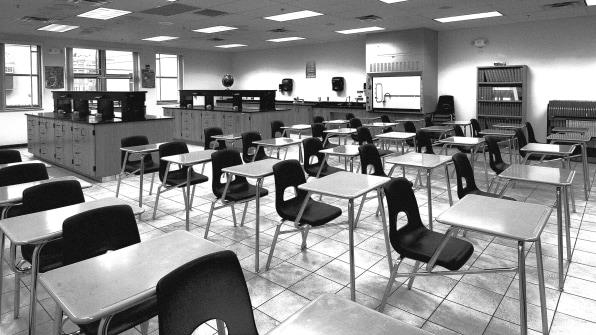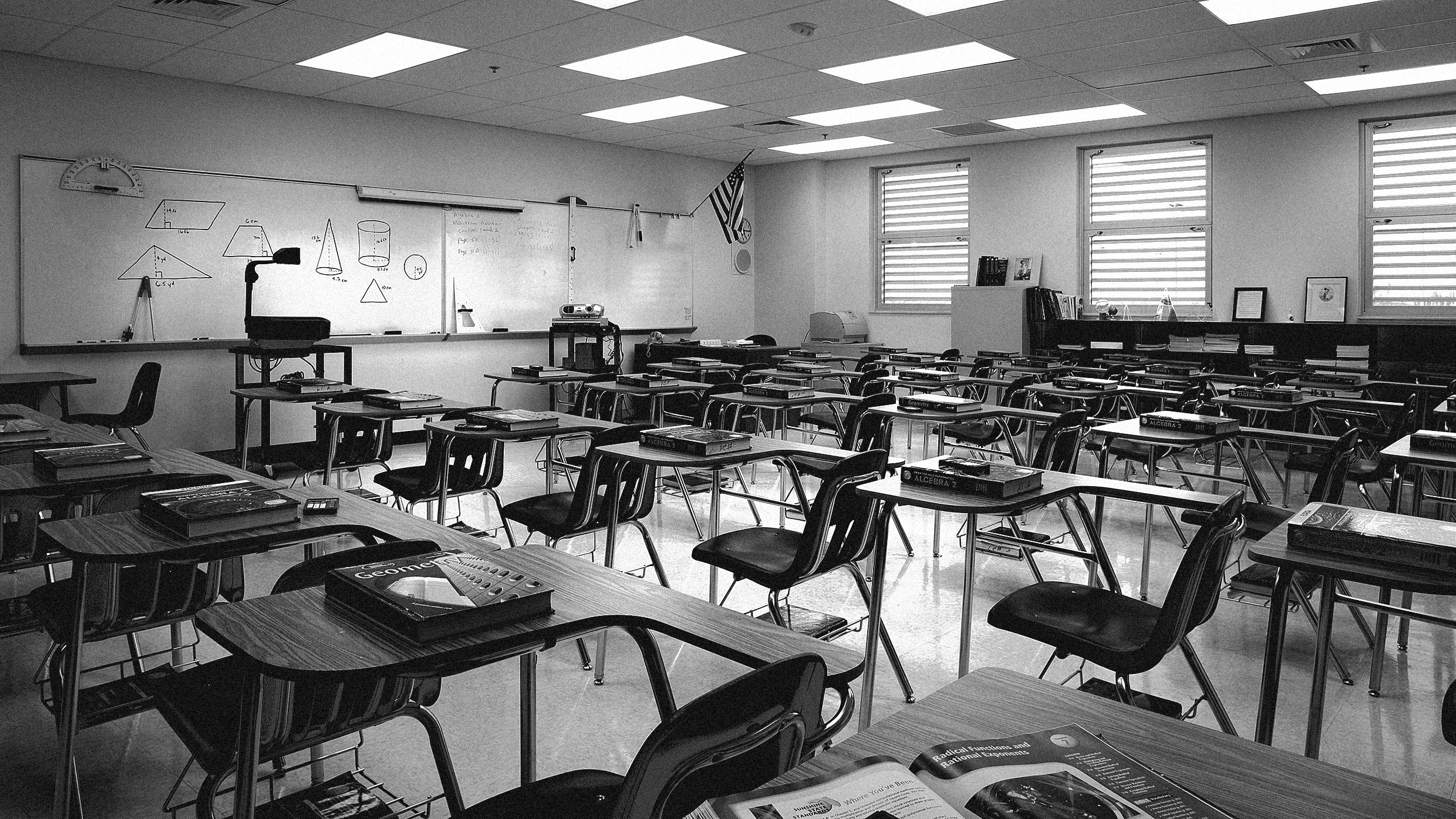How Florida became a hotbed for alternative education: Inside the move to help parents flee the ‘woke ideology’ of public schools
This story is part of an ongoing series about Florida Governor Ron DeSantis’ policies and how they impact the people in his state. For full coverage, click here.
LAKELAND, FLORIDA — In the foyer of the Medulla Baptist Church in Lakeland, Florida, there were copies of My Pillow Guy CEO Mike Lindell’s memoir; raffle tickets for a baseball hat with the words “Ultra MAGA;” and a pile of Lifesaver mints accompanied by a sign telling people to refresh the bad taste in their mouths caused by the indoctrination of their children.
This was the Wake Up to Woke Education conference. On a Saturday in May, inside the church about an hour east of Tampa, speakers—from conservative activists to homeschool teachers—preached about “wokeness” and a “gender identity cult” infiltrating public schools. The headmaster of a private school called the public school system “the largest state-owned monopoly outside of China.” The keynote address warned the audience to prepare for a “battle” of who gets to teach the next generation of American children.
The ultimate message: Parents, not the state or teachers, know how to best educate their children. Crucially, they also came with solutions: private schools, homeschooling, and a return to classical Christian curricula—along with legislation signed by Governor Ron DeSantis that makes it easier to access these alternatives. It’s not just Florida: This resurgence of educational freedom is replicating on a national scale, and while experts say shifts away from public education have historical precedents, the reaction to a supposed “woke indoctrination” poses a new threat to the stability of schooling in America.
Quisha King, the host of a conservative podcast and a former spokesperson for the right-wing activist group Moms For Liberty, was the event’s opening speaker. Based in Jacksonville, she runs Mass Exodus, an online resource for parents who want to pull their children out of public education but don’t know where to begin. On a follow-up call, King says she was motivated by the rise of things like critical race theory, which has led classes to be “infused” with a victim mentality, as well as classrooms that have “inappropriate materials.”
There’s been very little evidence that critical race theory, which teaches history through a racial lens, is being taught widely in public schools. But King, who also opened for DeSantis’ 2021 State of the State Address, still disagrees with the way history is being taught. “I want my children to learn history, but I don’t believe that because slavery happened that means that we still have systemic oppression,” says King, who is Black. “The kids don’t feel oppressed until someone is telling them they are oppressed.”
An exodus, from public schools to home classrooms
The “exodus” theme was common at the conference. Also speaking was Joshua Fontanilla, a former public school teacher who founded the Exodus Institute in 2021. This Sarasota-based online school offers an accredited K-12 education, comprising “all the traditional courses that you would get in a public school, minus all the woke stuff,” Fontanilla says. He declined to share enrollment numbers, though says it’s a small school, designed for parents who want to homeschool but don’t have the time to teach.
Homeschooling itself is surging in America. It had been growing steadily for years, and then almost doubled between 2020 and 2021, with the onset of the pandemic and remote schooling. Now, 3% to 4% of U.S. students are homeschooled—the highest figure ever, and comparable to those in charter schools and Catholic schools, according to a study coauthored by Elizabeth Bartholet, a professor at Harvard Law School’s Child Advocacy Program.

Many parents have kept their children in homeschools even post-pandemic. Bartholet says right-wing lobbyist groups have seized on this rise to make a further push to flee from the supposed “woke indoctrination” of public schools. Though modern homeschooling has traditionally been bipartisan, the study found that up to 90% of current homeschoolers are from the conservative Christian wing. Bartholet added that many want to keep their kids from being exposed to mainstream cultural ideas, such as secularism, atheism, and feminism.
Adam Laats, a professor at Binghamton University whose research focuses on culture wars in education, says framing homeschooling as a centuries-old American tradition, like many of the conference speakers did, is a myth. Very few families homeschooled before the mid-20th century. A niche, progressive-wing move in the 1960s was followed by a larger conservative movement a decade later. That latter push was largely spurred by Supreme Court decisions that had removed prayer and Bible reading from schools.
Laats says it’s the same pattern now, even though the trigger points are different. “The whole notion of saving schools by purging critical race theory, which was not taught in those schools, is just patently obviously pandering to people who aren’t sure what you’re talking about, but they’re nervous about the way things are going,” he says.
Arithmetic, virtue, and character formation
If the format of schooling is shifting, so is the content, with a revival of “classical education.” That’s a hard concept to define, as many variants exist. But one proponent, Jeremy Wayne Tate, says it mirrors the kind of education that America’s founding generation would have received, including ancient and Christian texts, classical languages, critical thinking, and philosophy. He adds that students should understand their own culture fully before they can appreciate others, like Eastern traditions.
Tate is the founder of the CLT, or Classical Learning Test, an alternative to the SAT and ACT, now accepted at about 5% of American universities. “The classical movement has reached a bit of a tipping point,” he says, and is at its strongest point since its initial rebirth in 1980. “There’s a movement right now in American education to go back to that.”
In studying the largely Western canon, many of which contain stories of heroism and nobility, Tate says students learn about living virtuously and grow to emulate those qualities. When questioned if this risks teaching that virtue is connected to whiteness and Westernness, he says many of the books come out of places like Athens and Jerusalem, rather than “like, Norway [and] the pasty white countries.”
About 37% of those who take the CLT are homeschooled, while 40% are in private schools, and 10% are in charter schools. One private school system it works with is the Association of Classical Christian Schools (ACCS), a group of 500 schools comprising 62,000 students nationwide. They’re known as “recovery schools,” says president David Goodwin, because they see themselves as restoring a form of education that went missing from public schools after about 1900. Now, they’re seeing a huge increase to their portfolio: They’re up from 20 or 30 startup schools per year to 110 last year, and they’re on pace for the same again.

Another group, Classical Conversations, which was one of the sponsors of the Lakeland conference, sells its curricula to homeschools that currently teach 120,000 U.S. students. CEO Robert Bortins says it focuses on primary source materials, so that students can analyze texts for themselves and not rely on the interpretations of teachers. “We’re not afraid of them reading about Marxism or any of the ideas that have shaped human culture, because we want them to see what the results of those ideas are,” he says, adding that inquiries are up by 30% to 40% since the pandemic.
But Laats says that classical training has some problematic elements, especially in regards to outdated concepts about character. Earlier this year, a federal appeals court ruled against a charter school in North Carolina that wanted to make it mandatory for girls to wear skirts, because, according to the school’s founder, every girl is a “fragile vessel” and needs to be defended in order to teach chivalry to boys.
There are also some controversial figures in the movement, like Douglas Wilson, an evangelical theologian and pastor who wrote scholarly cases for classical education in the 1990s and has been a major influence in its revival. But he has also written about slavery in a way that many interpret as white supremacist, he says homosexuality is a sin, and he claims wives should be submissive to their husbands. He is an advisor for ACCS and speaks at their conferences. (Both Wilson and Goodwin deny the claims of racism.)
“Those ideas are all wrapped up in this classical movement,” Laats says. “Sometimes people say it’s just about better learning, but either [they] don’t know enough about it, or [they’re] trying to bait a trap.”
DeSantis is helping—but it’s not always welcome
While some within this movement refrain from saying it’s political, others are open about its goals. Though he says his K-12 program is free of politics, Fontanilla also runs an enrichment program that’s explicitly political, set up to debunk supposed left-wing indoctrination. “All education is biased,” he says. “The idea that we can have education without getting across some kinds of values is foolish.”
Tate, on the other hand, says he doesn’t want the CLT to become a “red-state test.” Included on the CLT board is Christopher Rufo, who was the driving force in promoting the idea that critical race theory is pervading U.S. curricula. But Tate says those views are balanced out by progressive proponents, including Cornel West, the socialist professor and activist, who coauthored an op-ed with Tate in The Wall Street Journal favoring the test—and lauded DeSantis for his support.
DeSantis has approved the CLT for entrance to Florida’s public university system; if the board of governors confirms it in August, it will be the first state to do so. Still, Tate says he doesn’t want the CLT “co-opted by the Ron DeSantis brand.”
“We’re trying to make the case within the classical movement that some things transcend politics, and education is one of [them],” he says.
But Florida’s HB1, which DeSantis signed in March, was lauded at the Lakeland conference. It expands a voucher program so that parents of any income level have about $8,600 per child to use for public school alternatives. This year, 14 smaller states have signed similar bills. Progressive groups say it’s a misdirection of public funds into private schools—in Florida’s case, an estimated $2.4 billion.
Still, even some conservatives are against HB1. Though he says it would likely boost business, Bortins, the Classical Conversations CEO, is opposed on ideological grounds. “It’s basically universal basic income for children,” he says. “It’s effectively conservatives making every single family in Florida welfare queens.” He believes the quality of education will suffer. “In the long run, it will turn all the private schools basically into pseudo-public schools.”
Whether this movement will continue to expand or will fade away remains to be seen. If Tate has anything to do with it, it will grow exponentially. “This is just the beginning,” he says, expressing a desire to make his test the gold standard over the College Board in 20 years’ time.
Laats, who has also been skeptical about DeSantis’ ability to fundamentally change public education even with his Don’t Say Gay and Stop WOKE bills, says the movement will likely die down, like it has in the past. But homeschooling is unlikely to disappear, given the lobbying forces and lack of regulation, Bartholet says.
She agrees there are real problems with public schooling, which may include a lack of funding, disparities in resources, overcrowded classrooms, and low teacher pay. “I want to see public schools reformed. But I certainly don’t think the solutions these groups are coming up with are good or healthy for the country.”
(7)



